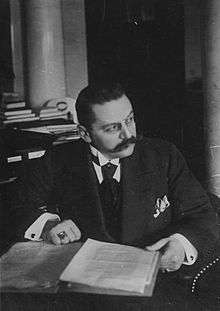Nikolay Maklakov
Nikolay Maklakov (9 September 1871 – 5 September 1918 (N.S.) was a Chamberlain of the Imperial court, State Councilor, and a prominent right wing statesman and a Russian monarchist. He served as Russia's Interior Minister from 16 December 1912 – 5 June 1915.
He was married to Princess Marie Obolensky (30 April 1874, Moscow - 25 September 1949, Menen).
Life

Nikolay was the son of an eye doctor in Moscow. He had a brother, Vasily Maklakov, a lawyer. He graduated from the historical-philological faculty of Moscow University (1893). In the next year he started to work for the Ministry of Finance. On 7 June 1909 he was appointed acting Governor of Chernigov, where he showed remarkable administrative ability.
The Emperor freed Maklakov from the Governor's office, but appointed him on 16 December 1912 as Manager in the Ministry of Internal Affairs. The appointment took place, despite the stubborn resistance of the Chairman of the Russian Council of Ministers V.N. Kokovtsov, who, not without reason, feared that Maklakov, closely associated with influential right-wing of Y.V. Bogdanovich and V.P. Meshchersky, will prevent the government's liberal policies. He was a member of the Union of the Russian People and friendly with Vladimir Dzhunkovsky.
On 21 February 1913 he was appointed as Minister of Interior. In his new position, Maklakov actively supported the monarchist movement. He prohibited the celebration of the poet Taras Shevchenko. The Minister pushed through the legislative institutions of ca 150 bills, including on the transformation of the police, the press, the zemstvo, on the transformation of the statistical section of the Ministry, and the second General census of the population. Not wanting to aggravate the political situation during the war and trying to unite society, the Emperor decided to meet the wishes of the liberals, and in June 1915 Maklakov was forced to resign.
In December 1916 he appealed with a letter to the Tsar, in which persuaded him to adopt a more rigid course, and to delay the resumption of sessions of the Duma to a later period.[1]
The Emperor instructed Maklakov on 8 February 1917 to prepare a Manifesto on the dissolution of the State Duma. Maklakov was one of the few dignitaries, taken on the eve of the February 1917 real steps to prevent revolution. On February 28, Maklakov was arrested. In prison, he was until his death. Maklakov was one of the few tsarist Ministers who had the courage to interrogations in the Investigation of the Commission not to abdicate their ideals.